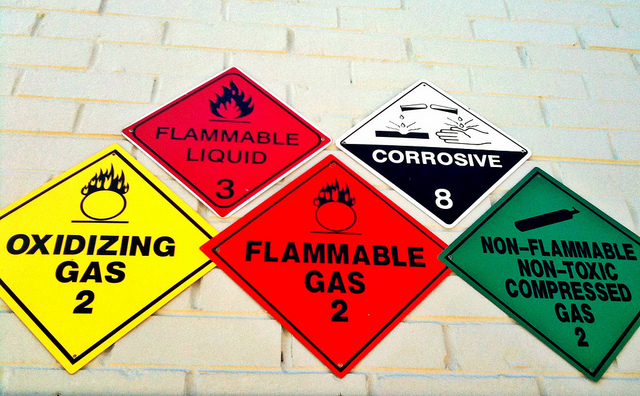In response to what it describes as “an alarming increase” in worksite injuries and fatalities related to communication tower activities, the federal Occupational Safety & Health Administration (OSHA) recently issued a memorandum for regional administrators. Intensified upgrades to cellular infrastructure (to cite an example from a few years ago, preparation to introduce 3G service) are likely contributing to the toll: 14 incidents in just a few months of 2013, a total greater than that of the previous two years combined.
Audit, Compliance and Risk Blog
Tags: Employer Best Practices, Health & Safety, OSHA, Employee Rights, California Legislation, Training
OSHA: Is It Time To Update The Process Safety Management Standard?
Posted by Jon Elliott on Thu, Jan 09, 2014
The Occupational Safety and Health Administration’s (OSHA’s) Standard for Process Safety Management of Highly Hazardous Chemicals (usually referred to as “PSM”) in 1992, requires extensive risk assessments and reduction efforts by facilities where a significant incident involving these chemicals might have catastrophic consequences. OSHA adopted PSM in 1992, and has made only minor technical revisions in the ensuing two decades. However, several federal and state initiatives are developing recommendations and may lead to significant changes in 2014.
Tags: Employer Best Practices, Health & Safety, OSHA, Training, Environmental, EHS, Hazcom
Email Notice and Due Diligence Under the Uniform Commercial Code
Posted by Steve Imparl on Tue, Jan 07, 2014
When a business or person is responsible for providing notice to another business or making that business aware of something, they must follow certain guidelines in conveying the information (e.g., sending it by registered mail on or before the required date), in order to show due diligence. Section 1-202(f) of the Uniform Commercial Code (U.C.C.) defines “due diligence” and “the exercise of due diligence” broadly. The U.C.C.’s requirements for “due diligence” include:
Tags: Corporate Governance, Business & Legal, Employer Best Practices, Internet
December 1, 2013 marked the first major compliance deadlines for most employers to comply with revisions to the Occupational Safety and Health Administration's (OSHA's) Hazard Communication Standard (HCS or Hazcom) adopted by OSHA effective May 25, 2012. Hazcom provides basic chemical information in millions of workplaces in the U.S. (Canadian readers will be familiar with analogous Workplace Hazardous Materials Information System (WHMIS) requirements).
Tags: Corporate Governance, Health & Safety, OSHA, Training, Hazcom
Employers in the United States must verify that new hires are eligible to work in the U.S. This responsibility was created by the Immigration Reform and Control Act (IRCA) of 1986, which drafted employers—on pain of being prosecuted themselves—into partnership with the federal government to deny job opportunities to unauthorized workers. Employers' compliance responsibilities are based on use of the I-9 Form ("Employment Eligibility Verification") issued by U.S. Citizenship and Immigration Services (USCIS). As information technology develops, USCIS has expanded electronic reporting and data management tools, the most important of which is called E-Verify. Both I-9's and E-Verify continue to evolve, and have received recent revisions.
Tags: Corporate Governance, Business & Legal, Employer Best Practices, Employee Rights, Workplace violence, Internet
Common Violations at Dealerships, Service and Repair Facilities
Posted by STP Editorial Team on Mon, Dec 09, 2013
Based on a limited survey of the Certified Unified Program Agencies (CUPAs) of the California Environmental Protection Agency (Cal/EPA), the Department of Toxic Substances Control (DTSC) found the following top eight violations:
Tags: Corporate Governance, Health & Safety, Environmental risks, Environmental, EPA
Environmental Compliance: EPA Tracks Reductions in GHG Emissions
Posted by Viola Funk on Fri, Dec 06, 2013
Do you ever wonder whether auditing of greenhouse gas emissions is working? It may be a bit early in the game to say for sure, given that GHG emission tracking standards are a recent phenomenon. But an annual report compiled by the U.S. Environmental Protection Agency (EPA) may be a good gauge of trends in emission reductions, judging by its latest installment.
Tags: Corporate Governance, Business & Legal, Health & Safety, Environmental risks, Environmental, EHS, EPA, Greenhouse Gas, ghg
Move Over Hazardous Chemicals … Here Comes Something Safer!
Posted by STP Editorial Team on Wed, Dec 04, 2013
American workers suffer more than 190,000 illnesses and 50,000 deaths annually as a result of working with and being exposed to tens of thousands of chemicals every day. Workplace chemical exposures have been linked to cancers, and other lung, kidney, skin, heart, stomach, brain, nerve, and reproductive diseases. While many of these chemicals are suspected of being harmful, only a fraction of them are regulated in the workplace.
Tags: Business & Legal, Health & Safety, OSHA, Environmental risks, Environmental, Hazcom
OSHA Proposes Expansion of Occupational Injury & Illness Reporting
Posted by Jon Elliott on Mon, Dec 02, 2013
The Occupational Safety and Health Administration (OSHA) requires employers to prepare and maintain records of occupational injuries and illnesses (I&Is), and to provide employees with annual summaries of I&I statistics for their "establishment." At present, OSHA and/or the Department of Labor's Bureau of Labor Statistics (BLS) can demand that selected employers report this information to them. BLS uses this information for statistical analyses of factors that cause workplace injuries and illnesses, and OSHA uses it to set rulemaking and enforcement priorities. In addition, OSHA requires all employers to report work-related accidents that result in one or more serious injuries or deaths (what OSHA calls "catastrophes").
Tags: Corporate Governance, Business & Legal, Employer Best Practices, Health & Safety, Employee Rights, Environmental
Derivatives and Hedging: Good News for Dealers and Brokers From FASB
Posted by Viola Funk on Wed, Nov 27, 2013
Dealers and brokers seeking hedging exposures to the Overnight Index Swap rate (OIS) are in luck. The Financial Accounting Standards Board (FASB) recently issued final guidance that allows dealer-brokers to designate the US OIS, the Fed Funds Effective Swap Rate, as a benchmark interest rate for hedge accounting purposes.
Tags: Business & Legal, SEC, Accounting & Tax, Accountants, US GAAP, GAAP



1.jpg)






